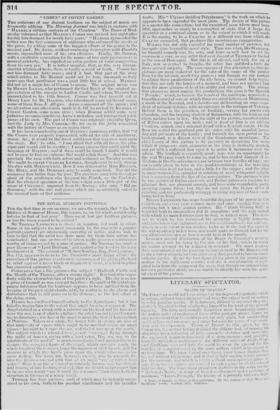" COMUS" AT COVENT GARDEN.
TnE criticisms of our diurnal brethren on the subject of music are frequently edifying. The Morning Journal was lately in raptures with " HA.NDEL'S sublime oratorio of the Creation." The Times of Wed- nesday informed us that MiLgoal's Comas was revived last night after having lain dormant for nearly forty years." " HANDEL (proceeded the critic) was the first composer of eminence who enhanced the merits of the piece, by adding some of the happiest efforts of his genius to the musical part. Dr. ARNE, without venturing to into/ere with Handel' s music, superadded some of his own effusions. Finally, Mr. Bisitor, with a creditable veneration for the names of two such predecessors in musical celebrity, has supplied an extra portion of vocal composition from his own pen." It is rather singular, that, in this very circum- stantial relation of facts, there is hardly a word of truth. Comas has • not lain dormant forty years ; and if it had, that part of the story which relates to Mr. Bisuoa could not be true, inasmuch as forty years ago that gentleman was a good little boy at school. HANDEL did not set a single line of Comas to music. The original music was by HENRY LAWES, who performed the first Spirit at the original re- presentation of the masque in Ludlow Castle, and whom MILTON has immortalized in his 13th Sonnet. Comlls was first brought out at Drury Lane by Dr. DALTON, who introduced many additional songs, sonic of them from L' Allegro. ARNE. composed all the music ; and no alteration was afterwards made in it, till its revival by KEMBLE at Covent Garden, some years since ; when Bisnoe added some very judicious accompaniments to ARNE'S melodies, and interspersed a few pieces of his own. The part of Conies was originally plavedby QuIN, and the Lady by Mrs. CIBBER.—SO far as to the flirts connected with the history of Comas as an maim; piece. It has been remarkedby one of MILTON'S numerous critics, that "if the Comas were properly represented, with all the aids of machinery, music, Scc., it would be the finest exhibition that was ever seen upon the stake. But," lie adds, " I am afraid that with all these, the prin- cipal part 'would still be wanting; I mean players that could wield the language of MILTON; and if these could be found, I doubt it would not be easy to find an audience that could relish them." And this was precisely the case with both actors and audience on Tuesday evening. We ought to except CHARLES KEMBLE, though even he took strange liberties with MILTON'S text. How it was delivered by Miss Hu oiias, Mr. Home and Mr. DURUSET, may be easily conceived. Nor did the composer fare better than the poet. The airs were sung with the vulgar slang of the gentlemen who frequent the Finish, or the Coal-hole. But the choicest specimen of the true vulgar was a little girl of the name of COVENEY, imported from the Surrey; who sang " Bid me discourse," with the airs and graces which are so admirably suited to the musical taste of that audience.


















 Previous page
Previous page